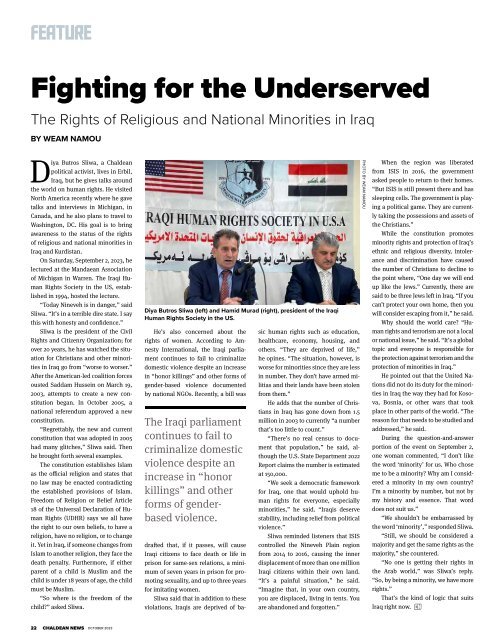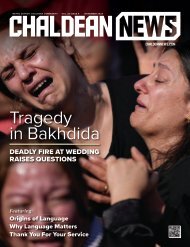Create successful ePaper yourself
Turn your PDF publications into a flip-book with our unique Google optimized e-Paper software.
FEATURE<br />
Fighting for the Underserved<br />
The Rights of Religious and National Minorities in Iraq<br />
BY WEAM NAMOU<br />
Diya Butros Sliwa, a Chaldean<br />
political activist, lives in Erbil,<br />
Iraq, but he gives talks around<br />
the world on human rights. He visited<br />
North America recently where he gave<br />
talks and interviews in Michigan, in<br />
Canada, and he also plans to travel to<br />
Washington, DC. His goal is to bring<br />
awareness to the status of the rights<br />
of religious and national minorities in<br />
Iraq and Kurdistan.<br />
On Saturday, September 2, <strong>2023</strong>, he<br />
lectured at the Mandaean Association<br />
of Michigan in Warren. The Iraqi Human<br />
Rights Society in the US, established<br />
in 1994, hosted the lecture.<br />
“Today Nineveh is in danger,” said<br />
Sliwa. “It’s in a terrible dire state. I say<br />
this with honesty and confidence.”<br />
Sliwa is the president of the Civil<br />
Rights and Citizenry Organization; for<br />
over 20 years, he has watched the situation<br />
for Christians and other minorities<br />
in Iraq go from “worse to worser.”<br />
After the American-led coalition forces<br />
ousted Saddam Hussein on March 19,<br />
2003, attempts to create a new constitution<br />
began. In October 2005, a<br />
national referendum approved a new<br />
constitution.<br />
“Regrettably, the new and current<br />
constitution that was adopted in 2005<br />
had many glitches,” Sliwa said. Then<br />
he brought forth several examples.<br />
The constitution establishes Islam<br />
as the official religion and states that<br />
no law may be enacted contradicting<br />
the established provisions of Islam.<br />
Freedom of Religion or Belief Article<br />
18 of the Universal Declaration of Human<br />
Rights (UDHR) says we all have<br />
the right to our own beliefs, to have a<br />
religion, have no religion, or to change<br />
it. Yet in Iraq, if someone changes from<br />
Islam to another religion, they face the<br />
death penalty. Furthermore, if either<br />
parent of a child is Muslim and the<br />
child is under 18 years of age, the child<br />
must be Muslim.<br />
“So where is the freedom of the<br />
child?” asked Sliwa.<br />
Diya Butros Sliwa (left) and Hamid Murad (right), president of the Iraqi<br />
Human Rights Society in the US.<br />
He’s also concerned about the<br />
rights of women. According to Amnesty<br />
International, the Iraqi parliament<br />
continues to fail to criminalize<br />
domestic violence despite an increase<br />
in “honor killings” and other forms of<br />
gender-based violence documented<br />
by national NGOs. Recently, a bill was<br />
The Iraqi parliament<br />
continues to fail to<br />
criminalize domestic<br />
violence despite an<br />
increase in “honor<br />
killings” and other<br />
forms of genderbased<br />
violence.<br />
drafted that, if it passes, will cause<br />
Iraqi citizens to face death or life in<br />
prison for same-sex relations, a minimum<br />
of seven years in prison for promoting<br />
sexuality, and up to three years<br />
for imitating women.<br />
Sliwa said that in addition to these<br />
violations, Iraqis are deprived of basic<br />
human rights such as education,<br />
healthcare, economy, housing, and<br />
others. “They are deprived of life,”<br />
he opines. “The situation, however, is<br />
worse for minorities since they are less<br />
in number. They don’t have armed militias<br />
and their lands have been stolen<br />
from them.”<br />
He adds that the number of Christians<br />
in Iraq has gone down from 1.5<br />
million in 2003 to currently “a number<br />
that’s too little to count.”<br />
“There’s no real census to document<br />
that population,” he said, although<br />
the U.S. State Department 2022<br />
Report claims the number is estimated<br />
at 150,000.<br />
“We seek a democratic framework<br />
for Iraq, one that would uphold human<br />
rights for everyone, especially<br />
minorities,” he said. “Iraqis deserve<br />
stability, including relief from political<br />
violence.”<br />
Sliwa reminded listeners that ISIS<br />
controlled the Nineveh Plain region<br />
from 2014 to 2016, causing the inner<br />
displacement of more than one million<br />
Iraqi citizens within their own land.<br />
“It’s a painful situation,” he said.<br />
“Imagine that, in your own country,<br />
you are displaced, living in tents. You<br />
are abandoned and forgotten.”<br />
PHOTO BY WEAM NAMOU<br />
When the region was liberated<br />
from ISIS in 2016, the government<br />
asked people to return to their homes.<br />
“But ISIS is still present there and has<br />
sleeping cells. The government is playing<br />
a political game. They are currently<br />
taking the possessions and assets of<br />
the Christians.”<br />
While the constitution promotes<br />
minority rights and protection of Iraq’s<br />
ethnic and religious diversity, intolerance<br />
and discrimination have caused<br />
the number of Christians to decline to<br />
the point where, “One day we will end<br />
up like the Jews.” Currently, there are<br />
said to be three Jews left in Iraq. “If you<br />
can’t protect your own home, then you<br />
will consider escaping from it,” he said.<br />
Why should the world care? “Human<br />
rights and terrorism are not a local<br />
or national issue,” he said. “It’s a global<br />
topic and everyone is responsible for<br />
the protection against terrorism and the<br />
protection of minorities in Iraq.”<br />
He pointed out that the United Nations<br />
did not do its duty for the minorities<br />
in Iraq the way they had for Kosova,<br />
Bosnia, or other wars that took<br />
place in other parts of the world. “The<br />
reason for that needs to be studied and<br />
addressed,” he said.<br />
During the question-and-answer<br />
portion of the event on September 2,<br />
one woman commented, “I don’t like<br />
the word ‘minority’ for us. Who chose<br />
me to be a minority? Why am I considered<br />
a minority in my own country?<br />
I’m a minority by number, but not by<br />
my history and essence. That word<br />
does not suit us.”<br />
“We shouldn’t be embarrassed by<br />
the word ‘minority’,” responded Sliwa.<br />
“Still, we should be considered a<br />
majority and get the same rights as the<br />
majority,” she countered.<br />
“No one is getting their rights in<br />
the Arab world,” was Sliwa’s reply.<br />
“So, by being a minority, we have more<br />
rights.”<br />
That’s the kind of logic that suits<br />
Iraq right now.<br />
22 CHALDEAN NEWS <strong>OCTOBER</strong> <strong>2023</strong>

















